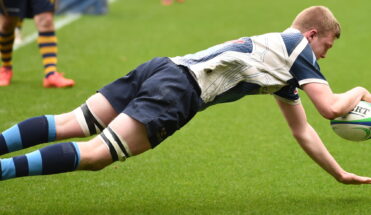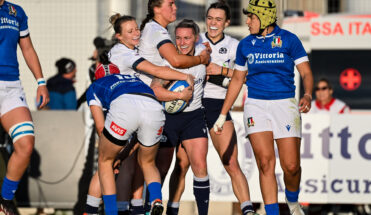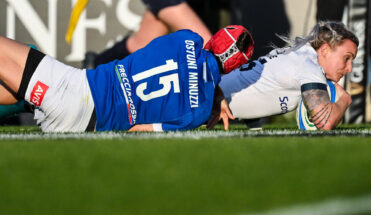Chris Paterson: Creating a legacy in Japan
Former Scotland captain Chris Paterson is out in the Far East for the Rugby World Cup and gives us his breakdown on the games he’s watched so far and on how rugby fever is taking over Japan from service stations to surprise firework shows.
After some fascinating games in Pool A and across the tournament, Chris discusses the matches he’s witnessed and analyses the key pieces of play that made them stand out. As part of the commentary team for World Rugby, Chris talks about the other games he’s seen and his upcoming week in Japan.
Chris on watching his national team defeat Samoa:
Congratulations to Scotland on their bonus point win. A professional performance in uniquely difficult conditions. The physicality shown in attack and especially in defence was outstanding. There were mistakes of course but the team’s ability to react positively whilst under a huge amount of pressure was good to see.
To hold the opposition to zero points is something we don’t see very often in international fixtures. That zero signifies a clarity of role, a discipline and an outstanding attitude in all aspects of defence from set-piece and collision to kick-chase.
I thought the attacking game was well-balanced and the kicking game hugely influential. It sounds ridiculous, given the roof was closed at the stadium in Kobe, but that game was akin to playing wet-weather rugby where tactical kicking from different sources supported by an aggressive and disciplined kick-chase was going to be pivotal, and after some early possession this was underlined. Scotland kicked accurately from 9, 10 and from out wide and as a result controlled large parts of the game.
The attacking kicking game can’t be ignored either – Finn Russell’s cross kick was perfect for Sean Maitland to attack and score, which was a perfect example of how important that element of the game is. It’s certainly an effective trend. We’ve seen so many examples in Japan already, it was really important in the New Zealand v South Africa game at the start of the championship creating two tries for the All Blacks and this weekend we saw Ireland’s two tries scored from kick-attack on Saturday; Wales’ first try on Sunday the was the same. Done well, it is a great foil to strong rush defences, and I’m sure there’ll be more to come.

On Pool A performances so far:
Pool A is wide open after all five teams have
played their opening two games. Preparation for Russia will start
immediately, and the challenge of that game and the final game of the pool
against the hosts, will excite the whole squad.
I was lucky enough to be commentating on the incredible game
in Shizuoka between Japan and Ireland, it was a pleasure to be there and to
witness one of the great games of rugby.
On creating a Rugby World Cup legacy:
Since coming to Japan, I have wondered what the long-lasting effect or the legacy of the Rugby World Cup would be on rugby in Japan.
Over the last three weeks rugby people will have been very aware of the event taking place here, but others will not have noticed. The branding and advertising of the tournament in some host venues is more visible than in others (understandable considering the size of the cities). The fan zones do look good and the games have been really well attended however there is definitely an excitement around the impact of Saturday night’s win. Non-rugby people are now aware.
After the game I travelled from Shizuoka to Tokyo and we stopped at a service station. It was around 10pm and we were still about two hours away from Tokyo. What we saw I think underlines the significance of the hosts’ win.
Rugby isn’t anywhere near the number one sport in Japan – it is dwarfed by baseball, sumo wrestling, football, golf and tennis amongst others, but in the service station there were hundreds of people huddled around TV screens that were showing the highlights of the game earlier in the evening. The momentum of rugby continues to grow, and the game here is only going to get bigger and bigger.
On that game, Ireland v Japan:
I really thought Ireland would win the game. I doubted whether Japan had the physicality to cope and compete with the abrasive way Ireland like to play. I was even more sure Ireland would go on to win after their two early tries, we’ve seen and spoken a lot about how hard it is to chase Ireland when they get ahead. But Ireland didn’t lose this game, Japan won it.
I shouldn’t have doubted their physicality. The front row was brilliant in all aspects of open play and are so dynamic, the back row and midfield too. Japan are a low tackling team, but they are able to make dominant low tackles. Most dominant tackles you see are collisions that are a little bit higher (around the midriff) but Japan hit lower than that. One potential weakness of tackling so low is that you allow the attacking players the opportunity to free their hands and offload, but Japan’s technique and power allows them to tackle low, with enough dominance to prevent or disrupt effective offloads.
I think it was their defence that broke Ireland’s resolve.
Ireland (whilst they were still ahead) were pressured in to playing a game they don’t like and one that doesn’t necessarily suit them. They started to try to throw risky offloads and turned over possession much more than normal. It looked like they tried to play a much wider attacking game as a result of being frustrated by the Japan defence, they went away from what has been such a successful blueprint.
Jamie Joseph the Japan coach said the same thing in his pre-match interview as he did in his post-match interview:
“We’ve been preparing for this game for a year and Ireland have only been preparing for it for a week”
You could see evidence of this preparation in their attack. Japan play quickly and a key element of their style of play is keeping their width. They fill the field well and this takes discipline; their back-row players who naturally want to follow the ball are often required to stay out wide. It’s a sign of being well-prepared and disciplined if you’re able to fight your instinct to follow the ball when you’re fatigued and you’re able to stick to the system.
The speed, physicality and accuracy of Japan really does make them a great team to watch. In front of their own fans, in their own country – what a brilliant challenge to face!
The atmosphere was utterly incredible too, culminating in a spectacular ‘surprise’ firework display. Either the Japanese organisers knew something special was going to happen and were on standby or the local 7-Eleven store stocks a cracking range of rockets!
Wales v Australia in Tokyo and scoring drop goals:
The game between Australia and Wales in Tokyo was another really entertaining yet fascinating game. Wales have developed a habit of performing under pressure and winning big games.
This was a big game.
Australia had won 13 of their last 14 fixtures against Wales but the one game in that sequence that they lost was the last encounter in Cardiff last November. Australia have been Wales’ bogey team in recent years but that 9-6 victory gave them the belief that they could do it.
In the build-up to this tournament a lot has been written about how important the drop goal is and Sunday’s game, as well as Camille Lopez’s match-winning drop for France v Argentina in the opening weekend and Stuart Hogg’s beauty against Samoa, demonstrates this yet again.
Wales dropped a goal in the 34th second of the game to get off to a perfect start and then again at the start of the second half to accumulate another three points after scoring 10 points in the last seven minutes of the first. Crucial points scored at crucial moments and the drop-goal, a much more difficult skill than it looks, often plays an important role.
The drop-goal has been integral in so many big Rugby World Cup moments;
Stransky, Wilkinson, Larkham, De Beer and who can forget Zinzan Brooke’s effort? I’m pretty sure it will have a further influence in 2019.
Wales hung in for the win after a dominant first half performance, but I think if Australia play like they did in the second half they will be very difficult to beat.
With the @rugbyworldcup pool stages almost at the halfway mark, @TelegraphSport have used Opta data to explore the emerging tactical trends. Looking at ruck-speed, drop goals, and more, the piece highlights the standout tactical behaviours so far. https://t.co/8XDahWKnP2. Ploy. pic.twitter.com/fuksgCsDlP
— Opta (@OptaSuit) October 1, 2019
Showboat! ?
Stuart Hogg finesses a drop-goal over the posts from the just shy of the halfway line. Colossal kick#RWC2019 #ITVRugby pic.twitter.com/zagNZw7WLG
— ITV Rugby (@ITVRugby) September 30, 2019
The influence of the stand-off:
The impact of reserve stand-off Matt To’omua was pivotal, he was outstanding, and he changed the game for Australia.
Rugby is getting more and more complicated, the amount of information the players have to retain and process before and during a game is considerably higher than before and is increasing every season, perhaps even too much information at times. Therefore, part of the stand-off’s role is selecting what the team need, where the opposition are vulnerable, how best to exploit that weakness and then comes the application and execution.
Matt To’omua can do all of that but on Sunday when he came off the bench, he drove his team on in a much simpler manner, he rolled his sleeves up and set a committed example that the rest of his teammates followed. It’s too simple to say he only ‘ran hard’ but what he did do was run hard at the space between defenders, he was aggressive and won the collision. It’s not really the primary role of your number 10 but he did it time and time again and as a result of his commitment he got in behind the Welsh front line defence, creating momentum meaning the next Australian ball carrier was able to attack off quick ball. This helped transform their performance.
Of course he did much more than that, he kicked his goals, tackled well, distributed very effectively and kicked at the right times but I like that, in an era where things can get very confusing, the simple things done well with the right attitude still make the difference.
The upcoming week:
I’m covering three more games for World Rugby again this week. France v USA on Wednesday, South Africa v Italy on Friday and France v Tonga on Sunday. It’s going to be really interesting to see how the pools take shape.
The Rugby World Cup is certainly making its mark in Japan.
Chris Paterson is the only Scotsman to play in four Rugby World Cups and is also Scotland’s highest point scorer. Catch up on his previous article that reflects on week one at the Rugby World Cup.
Continue to visit the Fan Zone at scottishrugby.org for exclusive interviews, articles, videos and image galleries from Japan.
Related Fanzone


Highlights: 2024 FOSROC Super Series Sprint | Round 1

Silver Saturday Preview: Women’s Shield final: Biggar v West of Scotland

Silver Saturday Preview: Men’s Bowl Final: Irvine v Blairgowrie


Gallery | FOSROC Super Series Sprint Round 1


Gallery: Italy 10-17 Scotland


Highlights: Italy 10-17 Scotland

Match report: Italy 10-17 Scotland

Review of Round 1 | Super Series Sprint

Preview: Italy v Scotland Women





